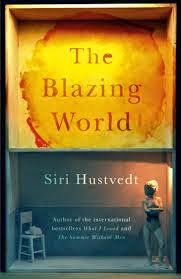I haven’t recently read a novel with such a complete and well thought-out character as Harriet Burden in Siri Hustvedt’s latest, The Blazing World. As multi-faceted and complex as she is, she is never contradictory and always completely convincing, something not many novels can achieve when it comes to character.
The Blazing World is about Harriet's troubled relationship with the hollow, insincere and deeply sexist art industry in the New York of the novel, Husdvedt having already tackled this subject in What I Loved. The book is written in a way that can very easily become hackneyed and glib, through a series of posthumous letters and diary entries written by Harriet and her close friends, family, associates and critics compiled by an art historian. As the novel unfolds the portrait completes itself, never with any cheap thrills or twists, only a grimly satisfying confirmation of the world that surrounds Harriet and how it shapes her. Harriet is placed awkwardly into the upper echelons of the art world, marrying a successful art dealer while still young and aspiring. After his death (very early in the proceedings, never fear) shakes her out of comfort and a veneer of well-maintained sanity, she resolves to prove what she has always known about her creative community by exhibiting a series of her work through the successive guises of three male artists. The results are not so much disastrous (at the time) than a cruel reality check for Harriet and those that care about her.
 Harriet's surrounding family, friends and lovers are perfectly placed within the story, both within their own voices and without, their presence really communicating the emotional reality that Harriet experiences. The literal and figurative heart of the novel lies here, when we experience Harriet both and her most vulnerable and at her most self assured, her most self-doubting and most triumphant. The thing about the way The Blazing World unfolds provides us and Harriet's legacy with closure. We catch her posthumous truth on the verge of it's explosion into the wider world, propelled not least by the revelations uncovered by the book itself. such is the fascinating circularity created by the novel.
Harriet's surrounding family, friends and lovers are perfectly placed within the story, both within their own voices and without, their presence really communicating the emotional reality that Harriet experiences. The literal and figurative heart of the novel lies here, when we experience Harriet both and her most vulnerable and at her most self assured, her most self-doubting and most triumphant. The thing about the way The Blazing World unfolds provides us and Harriet's legacy with closure. We catch her posthumous truth on the verge of it's explosion into the wider world, propelled not least by the revelations uncovered by the book itself. such is the fascinating circularity created by the novel.
All in all, I cannot recommend The Blazing World enough. Go get it!










